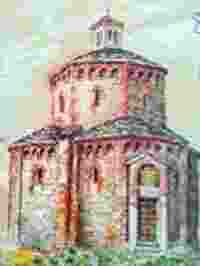Prophet

Obadiah
Obadiah is the fourth of the twelve minor prophets.
After the exile of the people of Israel, the prophet Obadiah foretold the wrath of the Lord against the enemy peoples.
Join us
Obadiah the Prophet
The book of Obadiah, with only 21 verses, is the shortest writing in the Hebrew Scriptures. In these writings Obadiah, whose name translates as "servant of God", presents a grandiose "judgment" on Edom, because this region bordering on Judea, had taken advantage of the fall of Jerusalem and the exile of the inhabitants to occupy the part of southern Judea. Many Jews, to escape the army of the Babylonian king Nebuchadnezzar, sought refuge with the Edomites, but these, instead, supported the invaders, actively participating in the sacking of the city and hunting the fugitives.
The people of Edom in the book of Obadiah are called by several names: "Esau", "mount of Esau" and "house of Esau". According to patriarchal accounts, Esau is also called Edom. Edom / Esau was Jacob's brother and settled in the region that he took his name - Idumea or Edom - and which is located south of Judea.
Obadiah denounces Edom's pride and enmity towards Jacob's descendants (aka Israel), claiming that this would be the cause of his downfall.
Obadiah prophesied against Edom, the envious enemy of Israel, a traitor to his "brother" (referring to Jacob and Esau, who were twin brothers), and for this reason destined to perish under divine wrath. "Vision of Obadiah. Thus says the Lord, God, concerning Edom [...] Behold, I make you little among the nations, you are deeply despised."
Edom had captured part of the territory of Judea, but a serious calamity struck the Kingdom of Judah. "Because of the violence done to your brother Jacob, you will be covered with shame and you will be exterminated forever. That day you were present, the day when the strangers took away his army, and the strangers came in by his gates and pulled at arose over Jerusalem; you also were like one of them.
Ah! do not rejoice in your brother's day of misfortune. Do not rejoice for the children of Judah in the day of their downfall. Do not speak with such arrogance on the day of distress. Do not pass through the gate of my people on the day of their misfortune; do not rejoice, too, in his affliction on the day of his misfortune; do not lay your hands on his army on the day of his misfortune. Do not stand at crossroads to exterminate his fugitives and do not hand over his survivors to the enemy on the day of misfortune!".
(Abd 10-14).
But the exiles will return. "For the day of the Lord is near for all nations, and as you have done, so it will be done to you: your deeds will fall upon your head. As you have drunk on my holy mountain, so will all nations drink; they will drink and gorge themselves., and they will be as if they never were. But on Mount Zion there will be survivors, and it will be holy; and the house of Jacob will possess what belongs to it. The house of Jacob will be a fire, and the house of Joseph a flame; and the house of Esau as straw which they will burn and consume; there will be nothing left of the house of Esau, for the Lord has spoken.
Those of the southern region will possess the mount of Esau; those of the plain will possess the land of the Philistines, the territory of Ephraim and that of Samaria; and Benjamin will possess Gilead. The deportees of this army, the children of Israel, will possess the land of the Canaanites as far as Sarepta, and the deportees of Jerusalem who are in Sepharad, will possess the cities of the southern region. The saved will go up to Mount Zion to judge the mountain of Esau. Then the kingdom will belong to the Lord".
(Abd 15-21).
The prophet reflects the vengeful spirit that prevailed at the time in the Jewish communities overwhelmed by that great cataclysm, but with this "sentence" the prophet manifests the presence and intervention of God in favor not only of individual justice, but also of community and collective justice.
